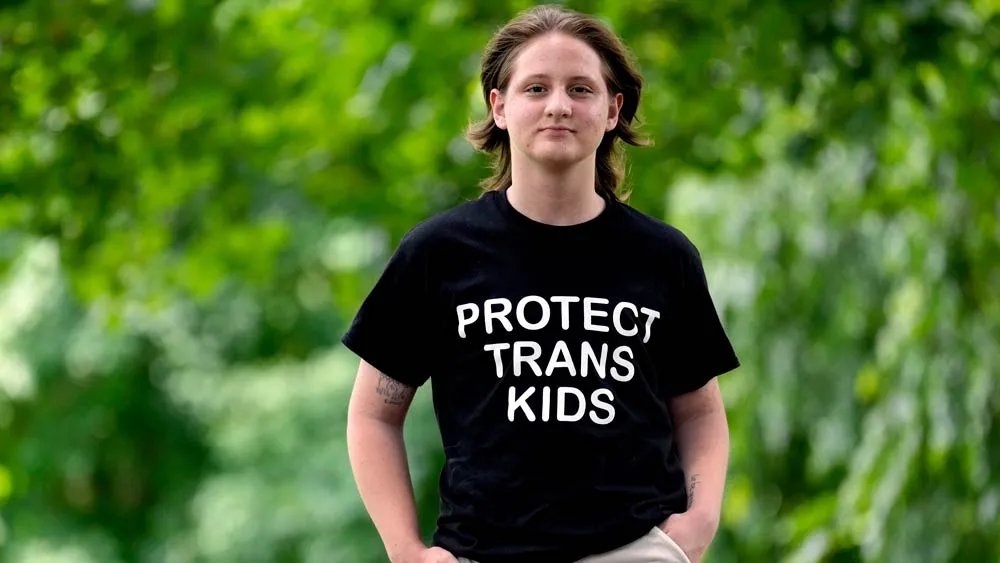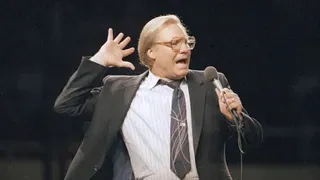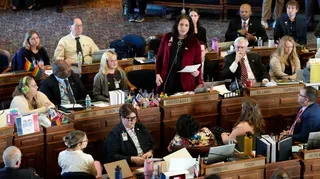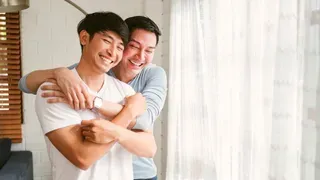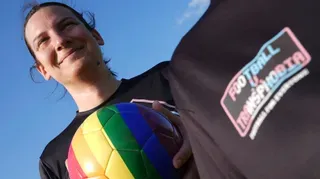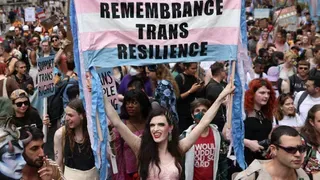January 13, 2008
She's still here
Michael Wood READ TIME: 6 MIN.
Jennifer Finney Boylan's new memoir, I'm Looking Through You, is a bit of a departure from her 2003 memoir She's Not There. While the latter book catapulted her to the top of the best sellers list and onto the Oprah show with her comic, intimate account of her transition from male to female, the new book takes a turn for the supernatural, recounting her experience growing up in a suburban house in Philadelphia that, according to local legend, was haunted. As part of her research for the book Boylan brought a team of paranormal investigators with her to go ghost hunting in her childhood home and had them moderate a conversation between herself and the ghost of her father. But Boylan, a skeptic about things that go bump in the night, spends much more time in the book writing about ghosts in a psychological sense, as pieces of her past that continue to haunt her. She said that while the new memoir is not as focused on transgender identity as She's Not There, the idea of being haunted is one that has special resonance for the transgender community.
"I'll say that I'm less interested in the Scooby Doo variety of ghosts than I am in the other kind, the psychological kind. ... If you're a trans person you really do feel like sometimes it's very hard to make sense of your life and really feel like there was a before and an after. Many trans people I know are kind of haunted by the ghosts of their younger selves, or, if you're a young person, by the ghost of the person you might become but can't quite figure out how to undergo that transformation," said Boylan. "So how do we find peace with the ghosts of our younger selves or the ghosts of our future selves? It's a memoir not only of growing up in a haunted house but a memoir of someone who lived in a haunted body. Issues of gender are right there at the heart of the book as well."
Boylan will read from I'm Looking Through You, which will be in stores Jan. 15, at a special Jan. 19 luncheon during the Tiffany Club's annual First Event conference, one of the largest and oldest transgender events in the country, which runs Jan. 16-20 at the Boston Marriott Peabody. Boylan will also present a workshop at the conference that afternoon on how to tell one's personal story through memoir writing.
For readers of She's Not There, the new book fills in some holes in Boylan's history, focusing on her relationships with two people who were largely absent from the first memoir. One of those people is her father, who died long before she transitioned.
"If you're a transgender woman the figure of your father does kind of loom above you," said Boylan. "And my father never got to see me as an adult and so never really knew me, and certainly never knew me as a woman. And so there's a sense of sorrow and of guilt, like, 'Oh my God, did I disappoint him? Did I let him down?'"
While Boylan went into the research for I'm Looking Through You feeling more than a bit dubious about the paranormal, she said one of the most surprising moments was when she had what she believes may have been a conversation with her father's ghost, courtesy of the paranormal investigators she invited to scope out her childhood home.
"And through these ghost busters I was able to supposedly have a conversation with him. I won't explain how they managed to set that up, but they did have this interesting system by which I could ask him a series of yes or no questions. And I had this, I have to say, very moving experience which ended with me feeling his hand on the side of my face. And I could feel him saying, 'Don't worry, you've done just fine,'" said Boylan. "But at the same time, [I'm] thinking, 'Wait, this has got to be all bullshit. Who would be so vulnerable and gullible that they would fall for something like this?' So it was a kind of funny experience in that I felt very moved by it but I was also very sarcastic about the whole thing and not sure whether to trust it."
The second person who Boylan writes about is her sister. After Boylan transitioned she said her sister broke off all contact with her, and when her sister visits their mother she insists that the mother take down all photos of Boylan in the house and hide all of her books.
"So there is a very clear sense in which she's become a ghost, too," said Boylan. "So much of the book is about that relationship and trying to make sense of it and trying to make peace with her, too."
Despite some of the weighty issues Boylan tackles in the book, she said readers of She's Not There would recognize the same wry sense of humor, and she believes the book's message about making peace with your past is ultimately an uplifting one.
"I think the thing people really get into is, some people live their lives as exes or formers or priors, people who are so defined by what they used to be that they're never really -- look at Art Garfunkel. ... So how do you avoid being a Garfunkel? Well, it's by trying to make peace with your past," Boylan said. "And how do you do that? I think the way you do that is by telling stories and by weaving the narrative of your life with one long thread so you can figure out how you got here from there."
Telling stories will be the focus of Boylan's workshop at First Event, and she said she feels it is crucial that more members of the trans community tell their stories to a mainstream audience. In many ways she said her own story -- as a white, middle-aged professional MTF -- has become the most familiar image of the trans community among mainstream America, while the stories of FTMs, genderqueer people, older trans people, trans veterans and others have garnered little notice. She said she will draw on her experience both as a writer and as an English professor at Colby College in Maine to talk about techniques for telling personal stories and the value of doing so.
In some respects Boylan said the success she had telling her own story in She's Not There has made her feel guilty speaking before transgender audiences.
"You turn one of these conferences on its side and about 2000 autobiographies fall out the door," said Boylan. "Everybody in there wants to write their story, and I feel a little guilty sometimes that my story has been held up as some sort of emblematic story when in fact it's really just one person's experience. And in some ways my experience is not exactly typical. ... As far as trans people go, I'm someone for whom things have generally gone very, very well. And some of that I'll take credit for. But some of it is also cultural privilege; [some of it is] privilege of being white, some of it is residual male privilege, some of it is privilege of class. And all those things are things to be suspicious of and to be wary of."
She said when her first memoir began climbing the best-seller lists she was uncomfortable seeing herself as an advocate for the transgender community to mainstream America. But over the past few years she said members of the community have convinced her that the publicity she garnered with her book comes with an obligation to use that exposure to benefit the transgender community as a whole.
"But I guess compared to five years ago when She's Not There came out I really do have a sense of responsibility for speaking for people other than me, quite frankly. When I wrote She's Not There, I was like, 'This is one person's memoir, it's just me.' And I got a lot of looks from people at conferences where they're like, 'You're a very lucky person, Jenny Boylan. Now it would be nice if you would use that fortune for the benefit of somebody other than yourself,'" said Boylan. "So I'm trying to do that. Like I said, I don't know how good at it I am, but I'm trying to do that."
Michael Wood is a contributor and Editorial Assistant for EDGE Publications.
